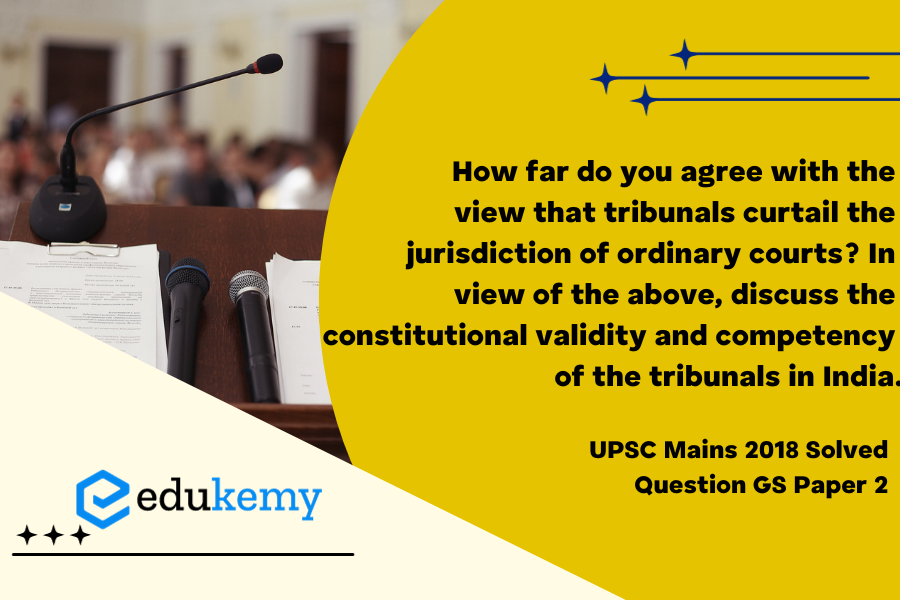The establishment and proliferation of tribunals in India have sparked a longstanding debate regarding their relationship with ordinary courts. While tribunals were envisioned as specialized bodies to expedite justice in specific areas, concerns have been raised about their potential to curtail the jurisdiction of traditional courts. This perspective posits that the rise of tribunals might undermine the authority and role of ordinary courts, thereby diluting the foundational principles of the Indian judiciary. Delving deeper into this discourse necessitates an exploration of the constitutional validity and competency of these tribunals. The Indian Constitution, as a guardian of justice and fairness, delineates the powers and functions of both courts and tribunals. However, questions arise regarding whether these tribunals, despite their specialized nature, uphold the constitutional ethos of separation of powers and the right to judicial recourse. This discussion aims to critically assess the symbiotic relationship between tribunals and ordinary courts, evaluating the constitutional underpinnings that guide their existence and operation in the Indian judicial landscape.
Tag: Statutory, regulatory, and various quasi-judicial bodies.
Contents
Decoding the Question:
- In the Introduction, try to briefly write about Tribunals and their role.
- In Body,
- Write how tribunals curtail the jurisdiction of ordinary courts.
- Discuss the constitutional validity and competency of the tribunals in India.
- In Conclusion, try to suggest some measures and write the overall importance of tribunals.
Answer:
The 42nd Amendment Act of 1976 added a new Part XIV-A to the Constitution; it established Tribunals as quasi-judicial bodies under Article 323A or 323B by an Act of Parliament and State Legislature. Tribunals resolve the matters that are brought before them and to reduce the burden of the judiciary and to bring expertise and speed to dispute resolution. These are not a court of law but enjoy some of the powers of a civil court, such as issuing summons and allowing witnesses to give evidence, etc.
Importance of Tribunals:
- The disposal rates of the cases in tribunals in comparison to the filing of cases per year are around 94%, which is welcoming.
- The tribunals follow the principle of natural justice; they also provide efficiency in dispensing justice with cost and time effectiveness.
- The tribunals help significantly in reducing the burden of the judiciary and involve specialists for effective justice delivery.

How Tribunals Curtail the Jurisdiction of Ordinary Courts:
- Article 50 of the Indian Constitution provides for the doctrine of separation of power; it requires states to separate executive and judiciary. The rampant tribalization has curtailed the jurisdiction of ordinary courts.
- The Supreme Court in the Chandra Kumar case (1997) held that the power of the High Court under Articles 226 and 227 of the Constitution to exercise judicial superintendence over the decisions of all courts and tribunals.
- Tribunals have replaced the High courts for disputes under the Companies Act, Competition Act, SEBI Act, Electricity Act, and Consumer Protection Act, among others.
- Any person aggrieved by the order of an appellate tribunal can directly appeal to the Supreme Court, side-stepping the high court. This raises three institutional concerns.
Constitutional Validity and Competency of Tribunals:
- Tribunals do not enjoy the same Constitutional protection as High courts and ordinary courts.
- The appointment process and service conditions of tribunals are under the control of the executive. Many tribunals owe their allegiance to ministries.
- Tribunals are also not as accessible as courts. For example, there are just four benches of the Green Tribunal for the whole country. This makes justice expensive and difficult to access.
- The retired High Court judges preside over tribunals, and the justification of expert adjudication by tribunals disappears.
- The direct right of appeal to the Supreme Court from tribunals has changed the Supreme Court from being a constitutional court to a mere appellate court. It has become a final clearinghouse for every appeal under every statute.
- The tribunals do not have a strict procedure and have flexibility in the work, which leads to the pendency of the cases.
- There is a lack of infrastructure, unsatisfactory service conditions, and delays engineered by lawyers and parties before the forums.
- There is a large number of vacancies in the tribunals, which is affecting the working and efficacy.
Measures to Strengthen Tribunals:
- The Law Commission recommended that a committee led by the CJI should be in charge of the appointments to important posts.
- The tribunals should be monitored by a single nodal agency under the aegis of the Ministry of Law and Justice to ensure uniformity in affairs.
- There should be a procedure for filling up vacancies, six months before the seats fall vacant.
- To ensure accessibility, there should be multiple branches of tribunals in different parts of the country.
The tribunals play a very important role in overcoming the crisis of delay and backlogs in courts. Over the years the number of tribunals has increased, which is creating conflict with the courts due to overlapping jurisdiction. The recommendations of the 272nd Law Commission report and SC judgments in the Union of India vs. R. Gandhi (2010) case can be considered to strengthen the working of tribunals and ensure effective & accessible justice delivery.
In case you still have your doubts, contact us on 9811333901.
For UPSC Prelims Resources, Click here
For Daily Updates and Study Material:
Join our Telegram Channel – Edukemy for IAS
- 1. Learn through Videos – here
- 2. Be Exam Ready by Practicing Daily MCQs – here
- 3. Daily Newsletter – Get all your Current Affairs Covered – here
- 4. Mains Answer Writing Practice – here


